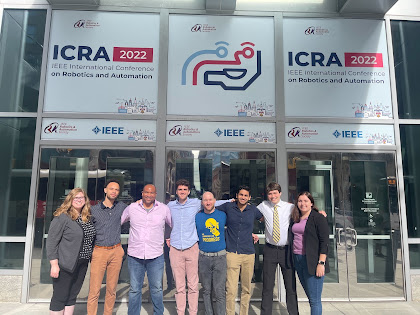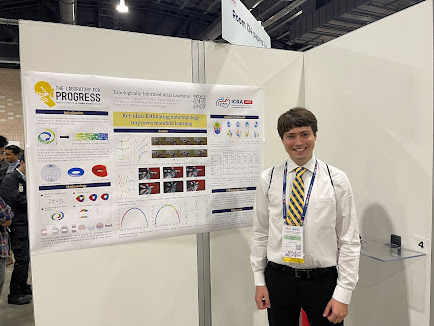ICRA 2022 Recap / First Blog Post
Last week, I attended the 2022 International Conference on Robotics and Automation (ICRA). This was my first in-person conference, and it was a wonderful opportunity to meet new people in the robotics world and catch up with Laboratory for Progress alumni. Of course, the main reason I attended ICRA was to presented the accepted paper Topologically-Informed Atlas Learning. I had the opportunity to give a 4 minute technical talk in the Representation Learning session and discuss this work further at the subsequent poster session.
While at the conference I attended a variety of interesting technical talks. From our lab, Anthony Opipari gave a workshop talk on his work Differentiable Nonparametric Belief Propagation, and Emily Sheetz gave a technical talk on her publication Composable Causality in Semantic Robot Programming (to appear in the conference proceedings). My advisor Chad Jenkins also gave an invited workshop talk on how best to combine probabilistic reasoning with data-driven neural networks. Outside of our lab, I got very excited about Sampling Over Riemannian Manifolds Using Kernel Herding (Sandesh Adhikary, Byron Boots), and am feeling a growing need to further my understanding of kernel spaces. I spent an entire poster session asking questions about Geometric Fabrics: Generalizing Classical Mechanics to Capture the Physics of Behavior (Karl Van Wyk et. al.) -- although I can't say I fully understand the paper yet, I definitely have a much better handle on it than before. Finally, I enjoyed learning about an approach to learning kinematic models for articulated objects from Kineverse: A Symbolic Articulation Model Framework for Model-Agnostic Mobile Manipulation (Adrian Röfer et. al.)The conference workshops were another immensely valuable experience. The conferences at ICRA were all day Monday and Friday (while Tuesday through Thursday were reserved for all other parts of the conference). On Monday, I spent practically the whole day at the 2nd Workshop on Representing and Manipulating Deformable Objects. My current research interests lie in the perception, representation, and manipulation of deformable objects, so I treated this workshop as my own tailor-made crash course in the field. The various talks and poster sessions were all excellent, but a few that really stood out to me were Learning Keypoints from Synthetic Data for Robotic Cloth Folding (Thomas Lips et. al.) and Real2Sim2Real: A Model for Deep Learning to Manipulate Deformable Objects (Ken Goldberg). For the Friday workshop, I mainly attended the workshop on Motion Planning with Implicit Neural Representations of Geometry. I'm really interested in the use of neural radiance fields (NeRFs) and similar neural models for representing the world. I was particularly interested in the workshop paper Learning Prior Mean Function for Gaussian Process Implicit Surfaces (Tarik Kelestemur et. al.), and how the Gaussian process is able to explicitly model uncertainty for different regions of the object model. I think there's a lot of potential for this sort of uncertainty measure to be used for the active learning of object models, to enable robots to intelligently refine their understanding of the world.
I definitely hope to do a deeper dive into several of the papers presented at the conference, and maybe try my hand at re-implementing some of their work to improve my understanding. But that's all for now!




Comments
Post a Comment